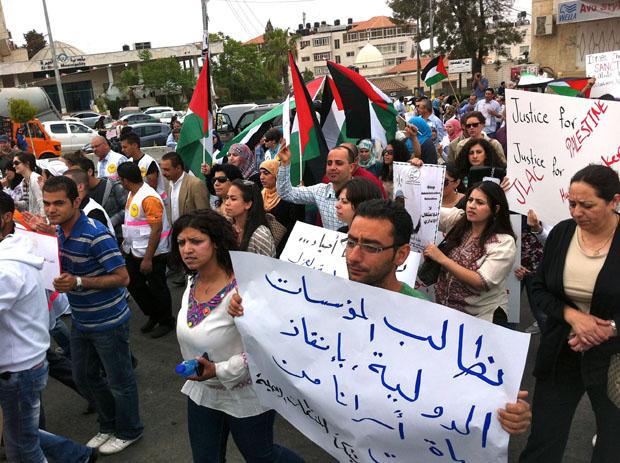28-Day Palestinian Hunger Strike Ends Following Deal
Palestinian demonstration in support of the hunger strike (Photo: Matthew Bell)
Hundreds of Palestinian prisoners in Israeli jails have agreed to end a 28-day hunger strike. Reports say that Israel agreed to some of the prisoners’ key demands for improved conditions. As part of the deal, Israel’s intelligence agency said Palestinian commanders of prison organizations committed to stop all terrorist activities from inside Israeli jails.
The news broke Monday morning that a deal was in the works: Egyptian officials were acting as mediators between Israel’s prison service and the prison leaders of the Palestinian political factions and militant groups.
As the leadership of the hunger striking prisoners discussed the terms of the proposed agreement this afternoon, some of their relatives continued a sit-in protest in Ramallah.
A woman in a black headscarf who gave her name as Imm Fairuz was there with her three young daughters.
“When we talk about the prisoners issue, we are talking about a core issue in Palestinian society,” she said. “This is the most important issue. They are our fathers. They are our sons. They are our husbands.”
This wasn’t the first hunger strike by Palestinian prisoners. But public attention has grown, with near daily protests in the West Bank and Gaza. Palestinian president Mahmoud Abbas said he was worried. If one of the prisoners died, he said, it could spark a “national disaster”. But Palestinian legislator Mustafa Barghouti paid a visit to the protest tent in Ramallah Monday and liked what he saw.
“What’s happening now is that people are more and more convinced with the power of non-violent resistance,” Barghouti said. “That you can get victory from non-violent resistance. And in my opinion the third intifada has started. But it is non-violent, it’s popular. People recognize that because they are not used to this form of resistance. But it’s going to continue. There is no other way for us to get our freedom except through non-violent resistance.”
Confirmation of a deal came late in the day Monday. And Palestinians celebrated.
In Gaza City there was an impromptu party. Women ululated and cried out their thanks to God. A spokesman for Hamas says all of the main demands of the prisoners have been met. On the key issue of imprisonment without trial, Israel has apparently agreed not to extend prison terms for about 300 prisoners being held under administrative detention, unless there is new evidence against them.
An Israeli official briefed on the terms of the deal said that family visits from Gaza are likely to be allowed. Inmates will also have more opportunities for education. It’s not clear whether the Israeli prison service will end the practice of solitary confinement.
And the official I spoke to said it’s also unlikely that Israel would fully abandon administrative detention in the future. After all, he said the United States still detains people without charges or trial.
A spokesman for the Israeli prime minister’s office said the deal to end the hunger strike came in response to a request from Palestinian President Mahmoud Abbas. The Israeli spokesman said the government’s hope was that the gesture would help build confidence between the parties and move forward toward peace.
Our coverage reaches millions each week, but only a small fraction of listeners contribute to sustain our program. We still need 224 more people to donate $100 or $10/monthly to unlock our $67,000 match. Will you help us get there today?
